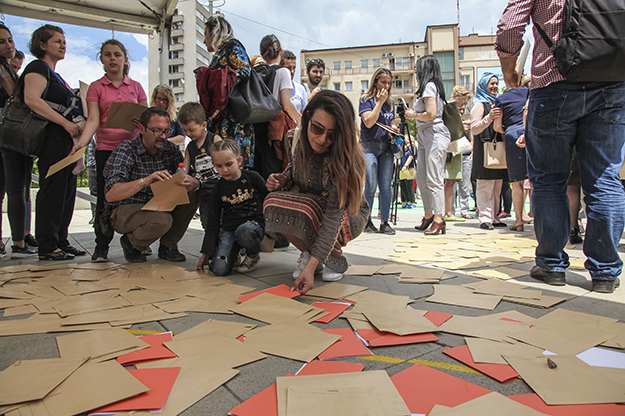“They took me, my mother and my three sisters from the big group of women and they took us to the school. They separated us: They took my mother to one classroom, two of my sisters to another classroom, and me and the other sister to another classroom. I didn’t know anything, because I was a child — 11 years old. Two of them were with me: a bald guy and a guy with tattoos on his face. They ripped my clothes and the horror they did. After that, with a knife, they carved a cross on my cheek and my forehead.
‘You will remember this,’ they told me in Albanian. I started to bleed and I don’t remember the rest, I lost consciousness. After the war, when my father would hear about other women he would say: ‘Thank God it didn’t happen in my house, because I would kill them with my own hands.’”
This story of a girl who was just 11 during the 1999 war in Kosovo is one of hundreds of accounts by people that experienced torture and sexual violence that have been made public for the first time. On June 19, the International Day for the Elimination of Sexual Violence in Conflict, printed papers in envelopes were placed in the middle of Zahir Pajaziti Square. Through these papers, the stories of survivors of wartime sexual violence marked the initiation of the ‘Be My Voice’ campaign.
Hundreds of citizens who joined the campaign, which was organized by the Kosova Rehabilitation Centre for Torture Victims (KRCT) and Medica Gjakova, were given the opportunity to take envelopes and read stories that illustrated the traumatic experiences of survivors of wartime sexual violence.
Each attendee — including the President of Kosovo Hashim Thaçi, former President Atifete Jahjaga, the Head of the EU in Kosovo Nataliya Apostolovska, U.S. Ambassador Greg Delawie, British Ambassador Ruairi O’Connell, Assembly deputies, activists, and survivors of sexual violence and their relatives — had a small yellow flower embroidered on their clothes.
Feride Rushiti, executive director of KRCT, explained that the yellow flower was chosen as an emblem of the campaign as it is a symbol of spring and friendship but also of fragility. She said the first public expression of these war narratives presents a necessary form of support for women and men who were victims of sexual violence and who have been unjustly stigmatized for years by their relatives and society, ever since the end of the war.
In 2015, the United Nations declared June 19 as the International Day for the Elimination of Sexual Violence in Conflict. Different activities are organized around the world to call for the elimination of sexual violence as a weapon of war in conflict. In Kosovo, human rights activists are seeking more support for survivors through this campaign.
Be My Voice comes six months after the initiation of the application process for attaining the legal status of war victim.
Rushiti told K2.0 that in recent years different campaigns have focused on the voice of victims, through slogans such as ‘Hear My Voice.’ According to her, now it is time for Kosovar society to be the voice of victims, through acceptance and empathy expressed, from those of families and communities to those of the institutions.
“Initially, when their voice was not heard, we started with ‘Hear My Voice,’ and I think we achieved our objective,” said Rushiti. “Now that their voice has been heard, it has been legally recognized and they are being compensated. However, we still have work to do regarding social attitudes. We must teach society to accept victims.”
According to Rushiti, a greater level of social support will undoubtedly encourage male and female survivors to apply for the status of victim and to seek their right for rehabilitation, recognition, reparation and justice.
The project will last for two years. At a national level a variety of videos will be made and activities held, whereas at the local level activists will work with local networks, such as communities and gender equality agencies, deputies and organizations.
Rushiti explained how the work in the field will be focused within communities, especially in rural areas, so that gradually discussions about sexual violence victims can be expanded to include the whole country.
“Many people are still unable to understand that the profile of raped women and girls varies greatly,” Rushiti said. “Sexual violence was a weapon of war used against victims of all backgrounds — urban and rural, young and old. Society spoke [about this] very little, debated very little. Therefore we made these stories public.”
Reparations welcome
From February, Kosovar survivors of wartime sexual violence have finally had access to the process of receiving long-awaited recognition and reparation for their suffering. But getting to this point has been far from easy.
They had to wait until 2014 for the right of survivors to reparation — mainly in the form of a monthly compensation payment of 230 euros — to be included in amendments to the law that covers the status of war victims. It was then a further three-year wait, until April 2017, for the Verification Commission, the body responsible for reviewing applications, to be established, and a further eight months for the reparation budget to be allocated.





